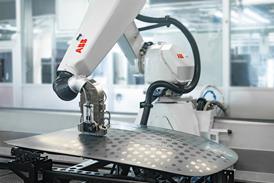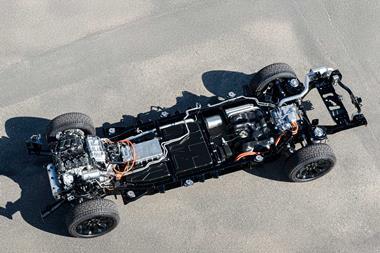
As carmakers search for solutions to help steer them through tough economic conditions, there are lessons from recent innovations by agricultural and construction equipment manufacturers
It’s difficult not to be impressed by Massey Ferguson’s giant Beauvais plant, located an hour’s drive north of Paris. The largest tractor manufacturing site in France, it churns out 19,000 units a year, and is the biggest European tractor plant operated by its Duluth, Georgia-based parent company, the AGCO Corporation. Five different brands are produced in addition to Massey Ferguson, including AGCO’s Challenger, Fendt, and Valtra marques – sold in Europe – and AGCO-branded tractors, destined for the American market. Perhaps surprisingly, all makes and models are produced on a single, mixed-model 92-workstation line. A chassis on the first workstation at the start of the day will be driven out that evening, roughly 45 hours of work content later, depending on the model and specification involved. Business is booming according to Andre Lair, Managing Director at the Beauvais plant. Only a few years after receiving a €130m (US$178m) investment to double capacity, growing demand will see volumes rise even further, from 90 units per day to 98 by the end of 2008. Biomass energy, rocketing food prices and the need to wrestle the highest yields possible from each hectare of ground have all contributed to significantly higher levels of demand, he explains.
“Thanks to a ten per cent improvement in productivity, we’re building almost 100 tractors a day without requiring another major round of investment,” he says. “Inventory turns have also increased – up from 16 turns a year in 2004 to 25 by mid-2007 – although that figure is slightly lower now because of the uncertain economic conditions.”
Adapting to current economic conditions
At privately held British construction equipment manufacturer JCB, the story is slightly different. The world’s third-largest manufacturer of construction equipment, with 18 plants around the world (11 in the UK, three in India, and one each in the USA, Germany, Brazil and China), JCB sold a record 72,000 machines worldwide in 2007.
But last year also saw the start of a steep downturn in the construction industry, leading to a slump in demand. With volumes down by 20 per cent, and with the possibility of further reductions in demand, the company was forced to announce job cuts of approximately 10 per cent of its UK workforce. Around 500 manufacturing positions across British JCB factories were lost, with a proportionate number of staff positions, about 150, also being cut. “JCB dealers around the world are experiencing lower sales because of reduced customer activity, mainly in the house building and commercial property sectors, and this has a direct impact on our machine build programme,” explains JCB Chief Executive Matthew Taylor. “These job losses are regrettable, but necessary to ensure that JCB remains competitive and well positioned to benefit from any market upturn.”
Facility investment to improve efficiency
JCB, like AGCO, is preparing for the future, setting up to be competitive and productive when the anticipated turnaround arrives. Additionally, the company’s heavy plant division, JCB Heavy Products, has recently completed the first phase of its move to a new, purpose built factory – representing a £40m (US$70m) investment in its Staffordshire manufacturing operations.
Work on the new facility, located in Uttoxeter, UK, started in 2007, and according to Taylor represents “an opportunity to capitalise on future growth potential when the construction equipment markets recover.” Production at the 41,806m² plant began in late August, a run of wheeled and zero-tailswing tracked excavators being first off the line. A transfer of employees from the company’s site located in the centre of Uttoxeter to the facility will take place in a series of moves scheduled between now and early 2009.
Designed to manufacture a range of 25 tracked and wheeled excavators, from seven to 46 tonnes, the new factory has also received new production equipment, an investment intended to boost both quality and productivity. Key to this has been the installation of automated conveyor lines from materials handling specialist Excel Automation, the same company that successfully carried out a £500,000 (US$874,000) project carried out at JCB’s cab systems plant in Rugeley, UK, dedicated to the manufacture of cab modules for installation at other JCB manufacturing sites.
According to Excel’s Director of Automobile and Aerospace David Hart, the old factory had not featured moving tracking. The new installation marks a major step in the plan to build an extension housing two new automated cab finishing lines, designed to produce fully-trimmed cabs for JCB’s Backhoe and Loadall ranges. “The intention was to automate the production process, streamlining it and reducing headcount,” he says. The design for both lines began in September 2006, with commissioning carried out in two stages: the Backhoe installation, completed in March 2007, and the Loadall line, carried out during JCB’s September shutdown.
 “The timescale was very tight. JCB was keen to get the improvements in place as quickly as possible, especially with the Backhoe line,” says Excel Project Manager Tony Maycock. With an overall length of 80 metres, the Backhoe line has 21 stations and features accumulating conveyors at the load and unload ends to allow for buffering. The line speed is approximately one metre per minute. Conversely, the Loadall line is 71 metres long and has 20 stations. Operating speed is slightly less than one metre per minute. It too is equipped with accumulating conveyors, plus a shuttle-car system powered by an inductive loop. This latter feature, explains Maycock, “is an extremely neat solution – it avoids having a solid conveyor forming a barrier across the assembly shop, a power-feed centenary system or loose wires.”
“The timescale was very tight. JCB was keen to get the improvements in place as quickly as possible, especially with the Backhoe line,” says Excel Project Manager Tony Maycock. With an overall length of 80 metres, the Backhoe line has 21 stations and features accumulating conveyors at the load and unload ends to allow for buffering. The line speed is approximately one metre per minute. Conversely, the Loadall line is 71 metres long and has 20 stations. Operating speed is slightly less than one metre per minute. It too is equipped with accumulating conveyors, plus a shuttle-car system powered by an inductive loop. This latter feature, explains Maycock, “is an extremely neat solution – it avoids having a solid conveyor forming a barrier across the assembly shop, a power-feed centenary system or loose wires.”
The new cab finishing lines have also allowed JCB to make changes at its main assembly plant in Rocester, UK, which will now receive fully finished cabs, according to Steve Cartwright, JCB Project Manufacturing Engineer. Previously, the plant had been supplied with cab variants from Rugeley, which were then configured and trimmed on dedicated trim lines to suit particular customer requirements.
Now deliveries from the Rocester plant are unloaded and the fully trimmed Backhoe and Loadall cabs fitted directly to the machines on the assembly lines. “The lines previously used at Rocester for final cab trim now provide extra production capacity to build Loadall and Backhoe machines,” says Cartwright.
Farm and construction equipment innovations
JCB’s investment is typical of the kind of manufacturing innovation that is increasingly being seen in the farm and construction equipment industry. Another case in point comes from German truck giant MAN Nutzfahrzeuge, the most rugged models of which are destined for the construction market.
Long an innovator in the technology field – 250 years old this year – the company is purported to have created the first diesel engine, the first steam turbine, and the world’s largest shipboard diesel engine. It is proving equally innovative in its manufacturing practices. An example of this is the recently adopted procedure by which truck frame sets arrive and are assembled at the company’s flagship Munich assembly plant, the frame sets being the giant chassis members which bolt together to produce a complete vehicle chassis.
Traditionally, these ungainly structures were ordered and delivered separately, an operation involving a complex marshalling and picking system that took up space and added cost. Now, orders are placed for complete truck sets (supplied by a former MAN Nutzfahrzeuge plant located near Mainz, Germany, that operates as a separate company), with all the frame set members required for a single truck chassis arriving as a complete unit, into which the smaller members and the relevant fasteners are bundled.
They are moved to the assembly line by roller conveyors as a single set, the strappings are cut, the smaller items extracted, and the assembly of yet another truck commences. Twelve hours later it is driven off the line. The impact on work in progress, use of space and cost has been significant, according to the plant’s Head of Supply Chain Management, Alexander Kessel. This innovation is typical of MAN Nutzfahrzeuge’s whole approach. “We want to reduce complexity at the line. We want to have short, flexible lines embodying lean production principles which are fed by short and flexible supply chains,” says Kessel.
As MAN Nutzfahrzeuge has moved from innovations in technology to innovating its manufacturing and logistics processes, JCB is moving the other direction; taking a solid production platform and developing new products to put through that manufacturing process.
Developing the product range
From a product line that was once relatively restricted to variants of the basic Backhoe, the company’s continual investment into research and development has led to what is now a range of over 300 machines. A company spokesperson adds that JCB offers “the largest range of compact equipment in the world, with solutions for industries as diverse as construction, agriculture, waste handling, landscaping, military, timber and many other specialist areas.” To some extent, this reflects the strategy of the industry as a whole, an ethos that can be summarised as ‘embrace range extension, or die’. In America, John Deere, headquartered in Leneka, Kansas, has been at the forefront of this range expansion ideal, in the process earning Fortune magazine’s ‘Most Admired’ award in the Industrial and Farm Equipment category in March this year, ahead of such companies as Caterpillar and Cummins.
As well as taking products that work well in one market and transferring them to others, John Deere is actively pursuing niche markets with highly targeted offerings. Case in point are a range of utility vehicles designed for use by the military and emergency services that the company has adapted for public consumption, marketed under the M Gator A1 brand.
Further niche applications include a range of speciality tractors, released earlier this year, specifically designed to meet the needs of orchards, vineyards, nurseries and greenhouse operation. The F Series orchard/vineyard tractors and A Series nursery/greenhouse tractors can manoeuvre and operate in the confined work environments of crops and plants. “This is the most significant line-up of new speciality tractors John Deere has introduced in years,” says Owen Frederic, Product Marketing Manager, John Deere Commercial Products.
JCB launches first in-house diesel engine
Arguably, JCB has taken such innovation one step further, moving the company beyond new vehicle adaptation and into developing specific powertrain solutions. In conjunction with specialist engine technology firm Ricardo Consulting Engineers, JCB launched an in-house diesel engine after the company’s third-party engine supplier was bought out by a competitor.
Introduced in 2004, the innovative JCB444 engine was the first to be manufactured by JCB. It was a risky decision. To maintain the trust of its customers and continue to command the respect of the industry, it needed to ensure that its move into engine production was a complete success. “With the JCB444, we set out to create an innovative diesel engine that was purpose built to power our construction equipment. It was our first move into diesel engine manufacture, and one with immense pressure to ensure a successful launch,” says Alan Tolley, JCB’s Director of Engine Programmes. “Customers and the industry at large were watching – we had to get it right first time.” The success of the move can be traced back to a handful of intelligent decisions. In a classic case of simultaneous engineering, the company worked in close co operation with a chosen group of partners and probable suppliers to accelerate product development.
The challenges faced by JCB, though, were huge. Not only did the company have to work within a tight timescale while avoiding the self-evident risks of introducing a less than serviceable product to market, but it also had to overcome the problems of co-ordinating the efforts of so many diverse partners. During the initial feasibility study and the subsequent product development phase, up to 20 design engineers from JCB and Ricardo were working on the JCB444 project at any one time.
Tolley explains that JCB used the same Siemens PLM Software NX digital product development platform that had underpinned the company’s design work for over 17 years to develop the engine. Familiar to the company’s design engineers, it made sense to use the platform while developing the new powerplant, the development team using the software to take their early ideas through a series of virtual testing processes to produce the finished 3D model. “From the outset, NX enabled us to incorporate all the components of the eventual 3D engine model into a single assembly file that everybody on the development team worked within,” says Tolley. “We were all working in context, with changes made to the design of a part by one engineer visible to every other engineer, helping to ensure that the interrelated parts fit together.”
What’s more, NX helped speed up progress to the next stage of product development – ‘real world’ physical trials of the prototype engine in construction vehicles. Prototype construction was further aided by the fact that JCB’s component suppliers and specialist prototype manufacturers could use the NX 3D design data in their own CNC machining and laser based prototype machines to manufacture new parts.
The result? The launch of what was heralded as a ground breaking product, perfectly suited to its purpose of powering construction and earth-moving equipment. The final product was rated as the world’s most powerful automotive diesel engine in terms of output per litre of capacity. “NX played a significant part in our eventual success,” says Tolley. “It afforded us the flexibility to work in an iterative way, making rapid changes as the product evolved and supporting us in our goal of bringing an innovative, high performance engine to market without delays or re work.”
Guarding against excessive complexity
One downside of an expanded range, similar to that at John Deere, is the increase in relative complexity; and with this can come dis-economies of scale including: increased aftersales and pre-production inventories, longer lead times, extended planning cycles and higher product costs – problems which further compound the already complex issues facing the agricultural and construction vehicles manufacturing industry.
At Massey Ferguson’s Beauvais plant, for instance, Andre Lair provides graphic illustrations of this complexity. AGCO is about to launch a new tractor. Considering possible option combinations and product adjustments for the local market, there are no fewer than 6,000 valid combinations of the tractor roof alone. Another stark statistic is the plant’s ‘repeat rate’, running at 1.5 tractors per year. “In other words,” says Lair, “on average, we’ll produce three tractors every two years that are identical.”
Such variety is both costly and dangerous according to Matthias Holweg, Director of the Centre for Process Excellence and Innovation at Cambridge University’s Judge Business School, and an academic well versed in automotive manufacturing issues. “Variety costs money in design and co-ordination, and when you find you’ve got the wrong variety in place, you have vehicles that customers don’t want which must be discounted to sell.” At AGCO’s head office, work is underway to find better ways of dealing with this complexity. Following a successful pilot programme, the company recently signed a deal to license an innovative software application from Emcien Corporation, a start-up business launched in partnership with the Georgia Institute of Technology.
Employing a mathematical technique known as ‘combinatorial optimisation’, the software works in a similar way to Amazon.com’s well-known ‘customers who bought this item also bought these other items’ feature, according to Emcien’s CEO, Radhika Subramanian. Products are modelled as collections of features and options and the demand history is then examined to identify patterns of buying.
“What we do is help companies figure out which options typically go together,” she says. “In other words, if they buy the radio, they’re likely to have the leather seats.” It seems the technique delivers on its promise. First trialled on a range of tractors acquired from New Yorkbased Caterpillar – each costing a considerable $225,000 to $275,000 (£128,000 to £157,000) per unit – the Emcien software was able to achieve a reduction in stocked unit configurations of 61 per cent, according to Randy Hoffman, AGCO’s Senior Vice-President of Global Sales and Marketing. By identifying seven base units, termed ‘stockers’ in AGCO-speak, covering between 90 and 95 per cent of base demand, AGCO was able to slash the holding time of the tractor inventory in question by 81 per cent. Welcome as the positive impact on inventory was, the effect the package had on capacity has been doubly so, particularly in a market that has strong cyclical demand. “Supplying all that variability consumes capacity. By finding a way to offer it manageably, we’ve been able to increase plant capacity by 25 per cent,” says Subramanian. “Companies like John Deere and AGCO are investing millions of dollars in new plants, but won’t see the benefits for 18 months. We can do it in 90 days.”
 Lessons for carmakers
Lessons for carmakers
It’s a message that’s been picked up in the world of car manufacturing. Emcien, explains Subramanian, is working with two – as yet unnamed – carmakers, one in North America and another in Europe.
“In the carmaking world, the benefit isn’t capacity. If anything, they’ve got excess capacity,” she says. “Instead, the issue is reducing the cost per car, which reduces the breakeven point for a lower volume and market-share percentage. They know how to make money from variety at very high volume levels – the trick is to continue to make money with smaller volumes and increased segmentation.” The irony is rich. Agricultural and construction equipment manufacturers have long been seen by their automotive counterparts as the ‘country cousins’ of the vehicle manufacturing sector. But now, while haemorrhaging red ink and undergoing corporate restructurings, plant shutdowns and employee layoffs, giants such as General Motors and Ford have a new role model – the humble agricultural and construction equipment manufacturer.





































